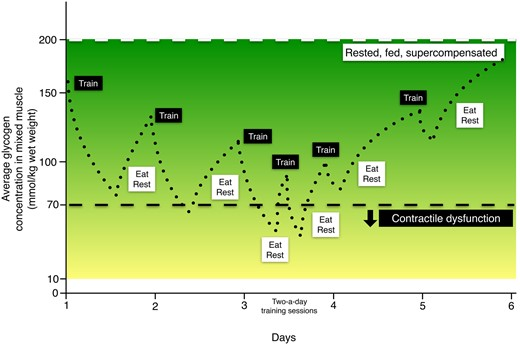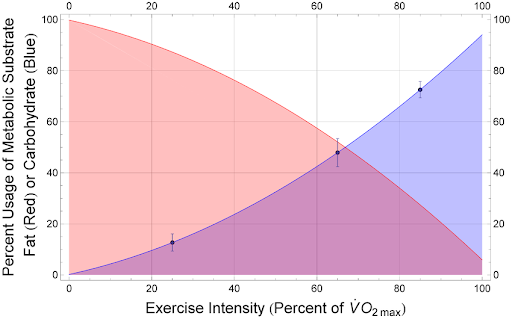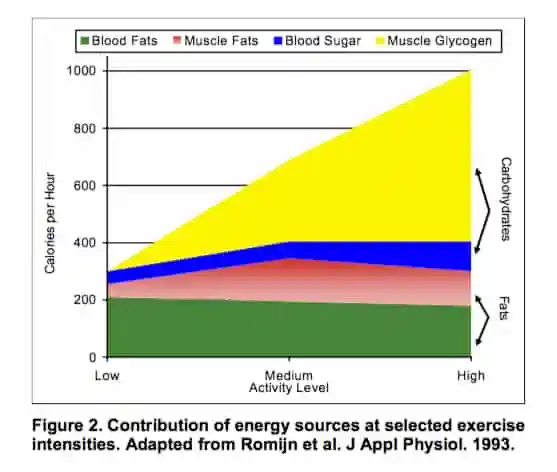
Fuel Your Workout
Carbs, protein or fat?
Just as we redeem money for food, the body redeems calories for energy. For our body to produce energy and perform work, it requires calories, calories that come from fat, protein or carbs.
Think of calories broken down into fats, carbs and protein, in the same way we break down money into 5,10 and 20 notes. Each macronutrient contributes to our workout differently to ultimately give us energy.
The type of energy required highly depends on the intensity and duration at which the person is training. During exercise our body obtains its energy from circulating blood glucose and muscle glycogen stores. These stores need to be fully stocked and replenished for the body to produce energy.

To give you a picture, an athlete would start training with full muscle glycogen stores, after 2 hours of intense training, these would reduce by half. Simple carb intake is recommended for him/her to continue performing optimally.
The type of fuel used, highly depends on the intensity and duration of exercise.
Carbohydrates
Are the primary source of fuel when an individual is working at a high intensity (at >/=60%VO₂max). However at a longer duration, muscle glycogen stores start becoming depleted and the body switches to fat as primary fuel.

The amount of carbohydrates needed is dependent on;
- sex of the athlete
- sport demands
- total daily energy expenditure
- environmental training conditions (cold, hot, humid)
The Nutrition and Athletic Performance position statement (2016) recommends an intake of 6-10g carbs/kg of bodyweight daily to support training demands - adding up to 50-60% of total caloric intake.
Example. 70kg male athlete = 420-700g daily.
Protein
The most hyped up macronutrient amongst athletes is protein. This is because protein is important for athletes to preserve their muscle mass. Endurance and strength athletes benefit the most from adequate protein intake, due to their need for muscle build up. Recommendations suggest 1-1.8g protein/kg of bodyweight daily.
Example. 70kg male athlete = 70-126g daily.
This amount can in the majority of cases be supplemented through diet alone, without the need for added supplements. However, if the body lacks adequate daily energy intake (calories) to maintain its body weight, the body won’t be able to make optimal use of protein for muscle build-up, and will instead use it to produce energy.
Fat
As explained earlier, when training for a long period of time, the body is able to switch to fat as a primary fuel source, converting it into energy. However, the use of fat as fuel, is not a simple process due to;
- Slow digestion - needs time to be broken down to an energy source
- Slow transportation - needs to be transported to the working muscles
- Conversion process - requires more oxygen than carb breakdown, hence the body needs to be working at a lower intensity for oxygen to be available for conversion
Fat provides energy at low intensity levels <60%VO₂max. Hence when endurance athletes are running long distances over a long period of time at low to moderate intensity, fat as a fuel source becomes important.

This however, does not warrant the need to stock up on fat prior to a marathon, because high fat pre-workout meals, tend to slow stomach digestion and cause issues with performance. A fat intake of 20-35% of your total daily energy intake is recommended.
Recommended Pre/Mid/Post workout Meals
Pre workout; wholegrain toast with peanut butter and banana/ chicken with rice/ greek yoghurt with chia seeds, oats and berries.
Mid workout (if longer than 2 hours); Banana/ dried fruits/ sports gels/ sports drinks/ gummy bears/ honey
Post workout; tuna salad with wholegrain rice/ chicken & veg/ Salmon, rice & veg/ omelette & avocado toast/ lentil/chickpea pasta.
The Complete Guide to Food for Sports Performance : Peak nutrition for your sport by researcher and sports dietitian Louise Burke is an excellent read on Sports Nutrition. Check it out !

